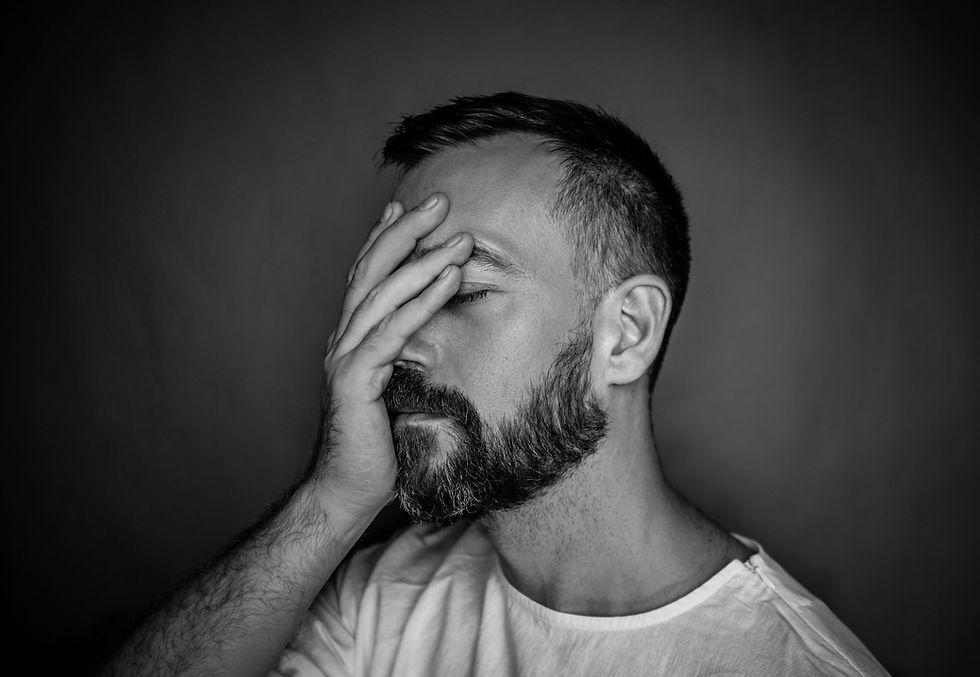Breaking the Stress, Anxiety, and Bad Sleep Cycle: Practical Tips for Restful Nights
- Amy

- Jan 22, 2025
- 4 min read
Let’s talk about something I frequently address with clients: the cycle of stress, anxiety, and poor sleep. It’s a common struggle but one that can absolutely be improved with the right strategies.
In this article, we'll explore how mental health affects our sleep, and my top tips to ease stress & anxiety for more restful nights.
Why Sleep Matters for Mental and Physical Health
Did you know only a third of people in the UK regularly achieve the recommended 7–9 hours of sleep each night? Sleep is essential not just for energy but for mental and physical health. It’s a two-way street: poor sleep can worsen mental health, and stress or anxiety can disrupt sleep. Those who are sleep-deprived are 2.5 times more likely to face mental health challenges.
This makes understanding the relationship between stress, anxiety, and sleep so important.

How Stress and Anxiety Impact Sleep
Stress is your body’s natural response to challenges, whether real or imagined. It activates the "fight or flight" response, which can leave you feeling tense, hyper-alert, and unable to relax. Anxiety compounds this with excessive worry, often making it difficult to both fall asleep and stay asleep. The result? A vicious cycle where poor sleep fuels stress and anxiety, which in turn disrupts sleep further. It can feel overwhelming, breaking the cycle is key but this can often be hard to do on your own.
It’s often the general stresses of life that keep us awake at night, but ironically, it’s also the worry about not sleeping enough that can stop us from getting the rest we need. This "sleep anxiety" can become a self-perpetuating cycle. If you find yourself struggling with it, try to remind yourself that your body is more resilient than you think. You’re likely capable of handling the next day better than you fear, even on less-than-perfect sleep. Trust that sleep will come when your body is ready.
Fear not though, it’s important to remember that some level of stress, anxiety, and even occasional sleep disruption is entirely normal. No one sleeps perfectly every single night, so don’t pressure yourself to achieve an unrealistic standard of sleep perfection.

8 Practical Strategies to Reduce Stress and Sleep Better
Here are some actionable steps you can take to ease stress and anxiety for better quality sleep:
Identify Your Stress Triggers: Understanding what’s causing your stress is the first step to managing it effectively. Take a moment to ask yourself: "Am I catastrophizing? Is this worry based on reality or just a hypothetical scenario? What’s a more constructive or helpful way to think about this?"
Create a Calm, Stress-Free Bedroom: Keep your bedroom a sanctuary for sleep and relaxation. Avoid bringing anything stressful into this space and reserve it only for sleep and intimacy to maintain a sense of calm.
Start Your Mornings Right: Stress hormones naturally peak in the morning, so ease into your day by minimizing stressors during the first hour after waking. This sets a positive tone for the rest of the day.
Boost Daytime Energy: Exposure to bright, natural light helps regulate your body clock and boosts energy. Incorporate regular exercise for stress relief or, if needed, take a short nap (20–30 minutes) to recharge.
Wind Down Before Bed: Dedicate at least 30 minutes before bed to relaxation. Avoid screens and focus on calming activities, such as reading, journaling, or gentle stretching, to help your mind and body transition to sleep.
Leave the Day Behind: Process your thoughts from the day and mentally prepare for tomorrow before bedtime. This practice helps prevent carrying unresolved worries into bed.
Stay Positive About Sleep: Avoid labelling yourself (or your child) as a "bad sleeper," as this mindset can create a self-fulfilling cycle. Instead, focus on the positives. Try writing down three things that went well during your day before going to sleep.
Accept Night time Wake-Ups: It’s normal to wake up briefly during the night. Instead of stressing, remind yourself that this is part of the natural sleep cycle. Avoid checking the clock or relying on sleep trackers, which can create unnecessary pressure and anxiety.
For more guidance on switching off thoughts when trying to sleep, check out my post: Quiet Your Mind for Sleep.
Take One Small Step Toward Better Sleep
Improving sleep doesn’t have to mean drastic changes. What’s one small adjustment you can commit to today? Start with something simple from the tips above and stick with it—you’ll likely notice a difference.
Get 1-1 Support
I hope you’ve found this article helpful! If you’re struggling to break the stress-sleep cycle or want to improve your sleep, I can help, so please do get in touch. Book a free consultation or an Immediate Sleep Support session here: Schedule a Call.

I'm Amy, a Holistic Sleep Coach and Certified Sleep Consultant Practitioner for adults & teens. I help people improve their sleep to feel and perform at their best, using The Good Sleep Method.
If you are looking for 1-1 tailored support to get a better night's sleep and tackle sleep anxiety for good, book a call with me to get started.
You can read more about me here.
Follow me on Instagram @thegoodsleepmethod




Comments